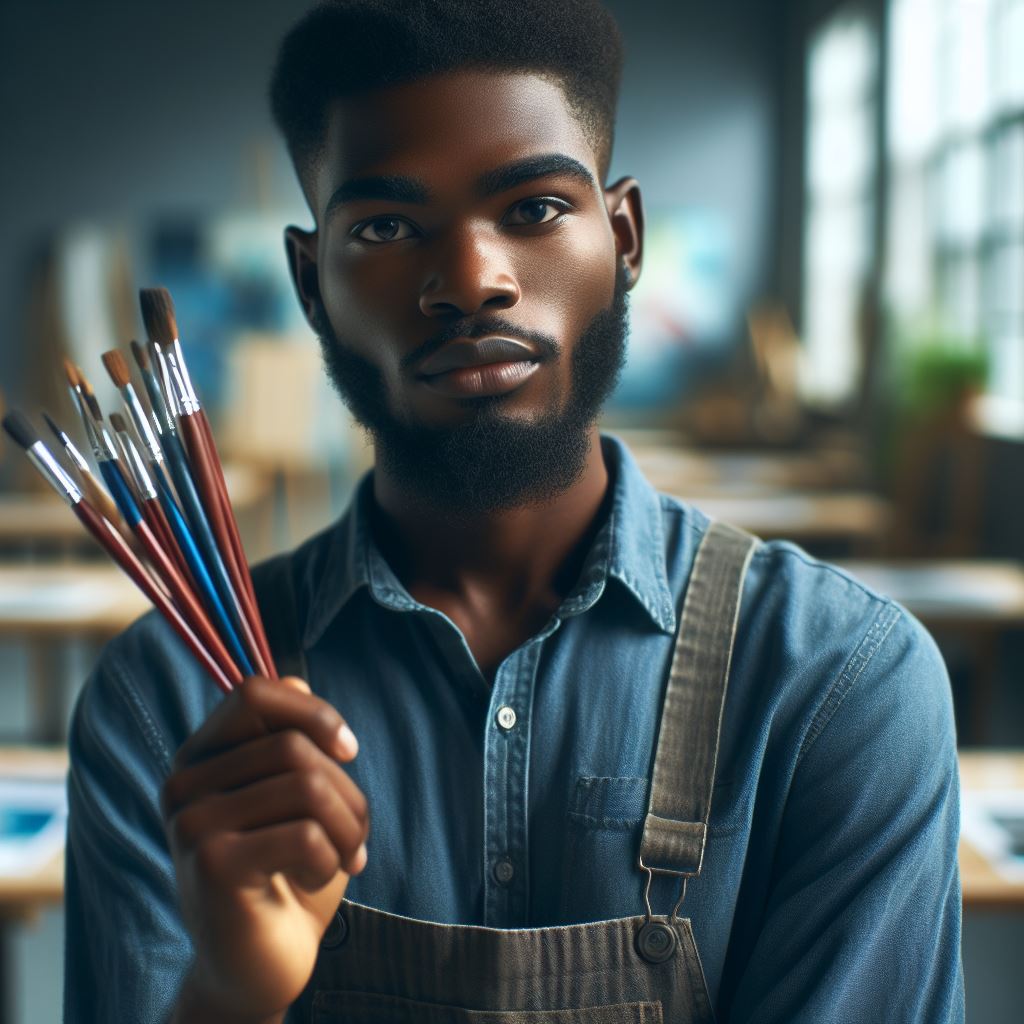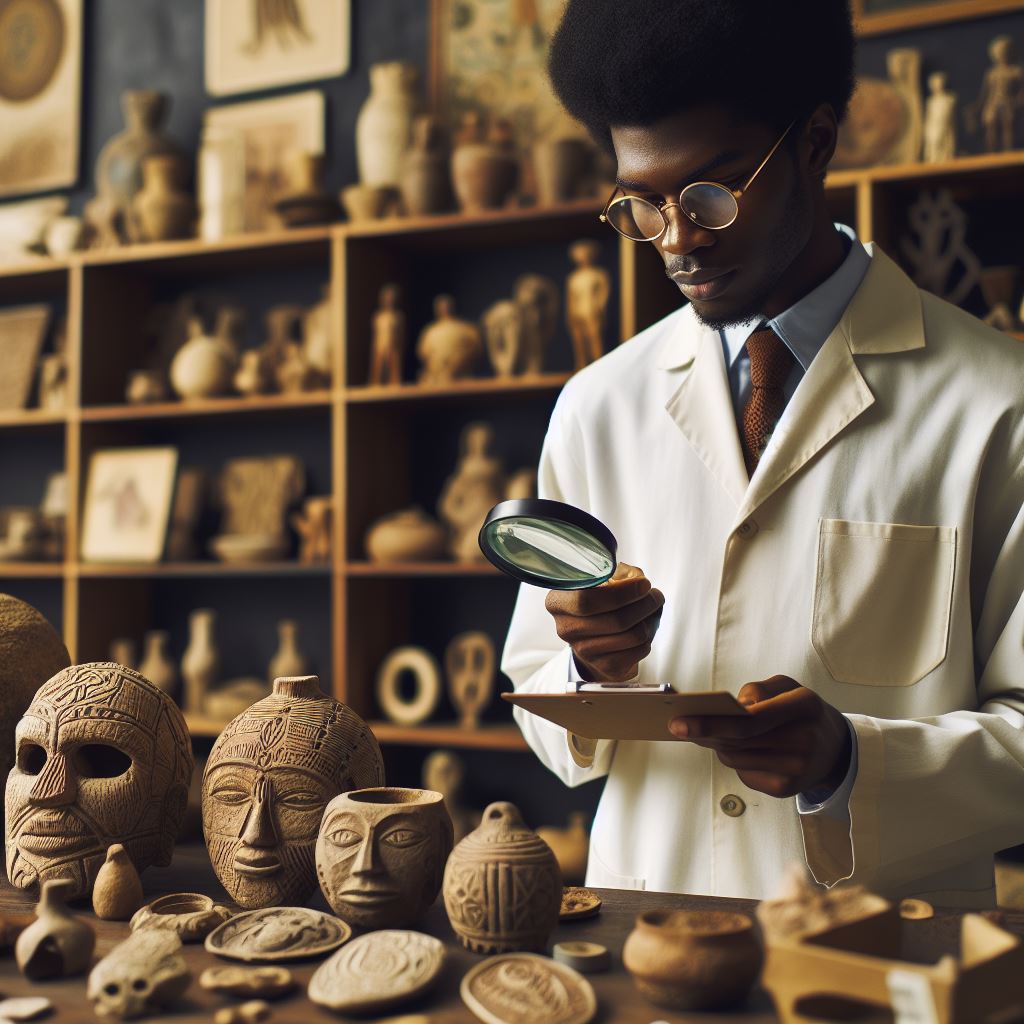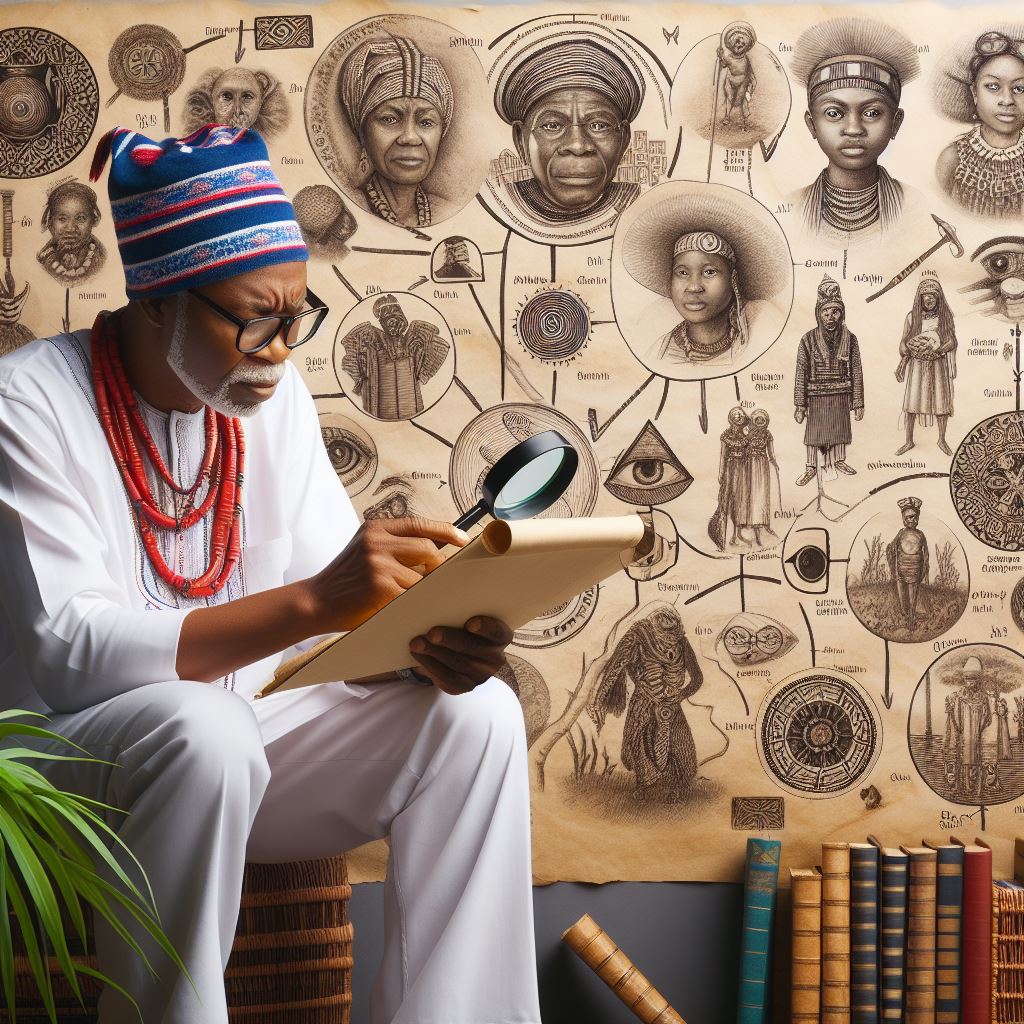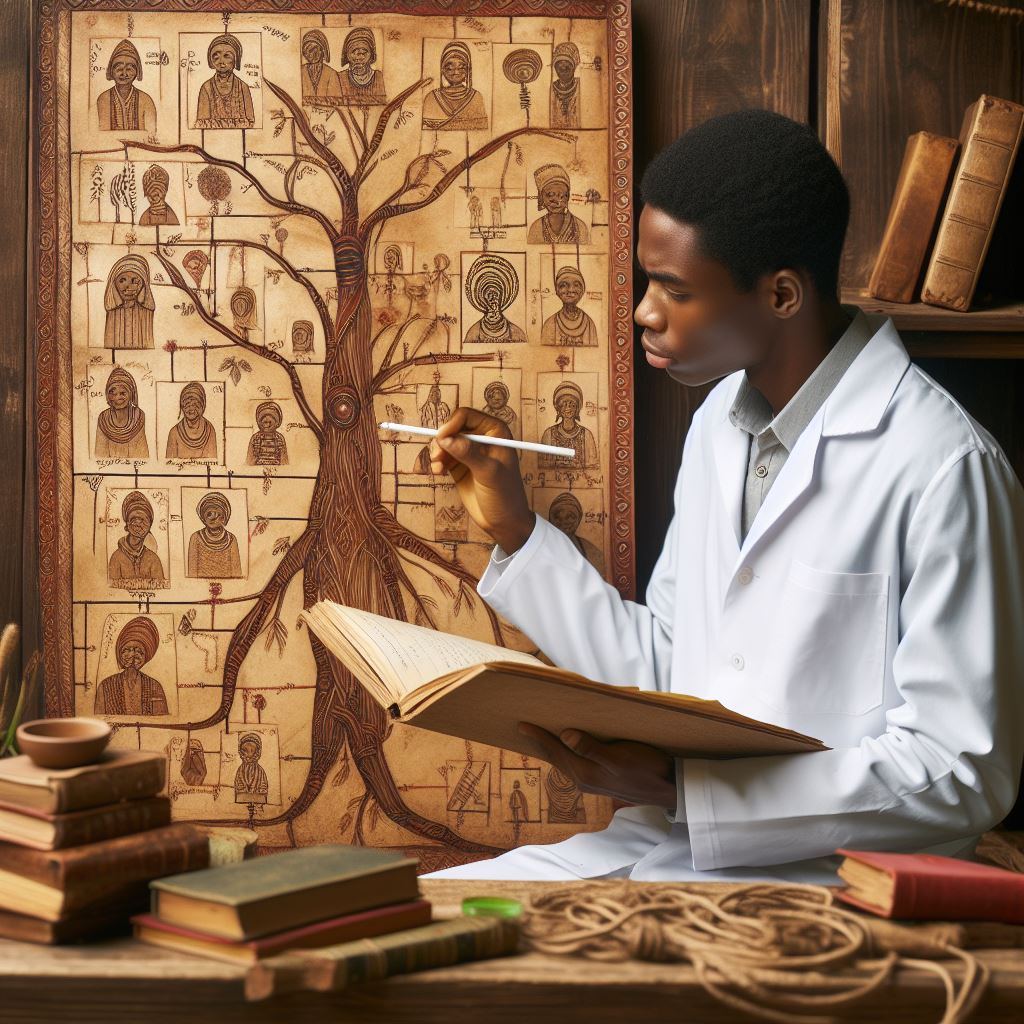Introduction
In the vibrant Nigerian art scene, artists face numerous challenges that hinder their creative expression and success.
From limited access to resources to lack of institutional support, these obstacles threaten the growth and sustainability of artists in Nigeria.
One of the major challenges faced by Nigerian artists is the lack of financial resources to support their creative endeavors.
This includes funding for materials, exhibition spaces, and marketing efforts.
The art infrastructure in Nigeria is underdeveloped, with a shortage of galleries, museums, and arts institutions.
This limits artists’ opportunities for exposure and recognition both locally and internationally.
Nigerian artists often struggle to protect their intellectual property, leading to issues of plagiarism and exploitation.
The absence of robust copyright laws and enforcement mechanisms further exacerbate this problem.
There is a lack of institutional support for Nigerian artists, including training programs, residency opportunities, and grants.
This hinders their professional development and limits their access to networks and collaborations.
In a society that often prioritizes traditional professions over artistic pursuits, Nigerian artists face social stigma and lack of recognition.
This can impact their self-esteem and motivation to pursue a career in the arts.
Despite these challenges, Nigerian artists continue to push boundaries and create impactful work that reflects their rich cultural heritage and diverse experiences.
Addressing these obstacles through advocacy, collaboration, and investment is crucial to nurturing a thriving art ecosystem in Nigeria.
Lack of infrastructure and resources
Limited access to proper art materials and equipment
One of the major challenges facing Nigerian artists today is the difficulty in accessing high-quality art materials and equipment.
Many artists struggle to afford paints, brushes, canvases, and other essential tools needed to create their art.
This limitation hampers their creative process and affects the quality of their work.
Without the right materials, artists may not be able to fully realize their vision and potential.
Absence of art galleries and exhibition spaces in many regions
Another significant obstacle that Nigerian artists face is the lack of art galleries and exhibition spaces in many regions of the country.
This scarcity makes it challenging for artists to showcase their work to a wider audience and gain recognition for their talents.
Without proper venues to display their art, artists may struggle to attract buyers, collectors, and patrons who can support their careers.
This limitation not only hinders artists’ ability to earn a living but also deprives them of valuable opportunities to network and collaborate with other creatives.
Read: Contributions of Nigerian Universities to Arts
Limited funding opportunities
Difficulties Nigerian artists face in securing financial support for their projects
Nigerian artists face significant difficulties in securing financial support for their projects.
Many rely on personal savings or modest incomes to fund their creative endeavors.
Private investors often view the arts as a risky investment, leading to frequent rejections.
Consequently, artists struggle to raise the necessary capital to start or complete their projects.
The financial instability hinders artists from fully exploring their creative potential.
Many promising projects are abandoned due to a lack of funds.
Without adequate financial backing, artists find it challenging to access quality materials, hire skilled collaborators, or market their work effectively.
This situation stifles the growth and visibility of the Nigerian art scene.
Moreover, artists often lack the business acumen to attract potential investors.
They may not have the skills to develop compelling proposals or financial plans that appeal to funders.
This gap further exacerbates their funding challenges, making it even harder to secure necessary resources.
Lack of government grants and funding for art initiatives
The Nigerian government provides minimal support for the arts, prioritizing other sectors instead.
This lack of government grants and funding significantly impacts artists and art initiatives.
Without state support, many cultural projects remain underfunded or unrealized.
Government neglect of the arts sends a discouraging message to potential private investors and sponsors.
If the state does not value or support the arts, businesses and individuals are less likely to do so. This creates a cycle of underfunding that is hard to break.
Furthermore, the absence of government-backed programs limits opportunities for emerging artists.
Transform Your Career with Expert Guidance
Get personalized mentorship consulting that’s tailored to your unique path. Our expert advice is actionable and exclusive.
Get StartedIn many countries, government grants help artists at the start of their careers, providing essential resources and exposure.
Nigerian artists lack this foundational support, which can be crucial for their development and success.
The sparse funding also impacts art education and community outreach programs.
These initiatives are vital for nurturing future generations of artists and fostering a vibrant cultural environment.
Without adequate funding, these programs struggle to sustain themselves, leading to a decline in artistic talent and engagement within the community.
In general, limited funding opportunities present a significant challenge for Nigerian artists.
They struggle with financial insecurity due to the lack of private investment and government support.
This financial strain restricts their ability to innovate and grow, hindering the overall development of the Nigerian art scene.
Read: Anthropological Insights on Nigerian Traditional Medicine
Cultural stigma
One of the significant challenges facing Nigerian artists today is the cultural stigma attached to pursuing a career in art.
In many Nigerian societies, art is often viewed as a less prestigious and financially rewarding profession compared to more traditional career paths such as law, medicine, or engineering.
This cultural perception has a detrimental impact on the value placed on artists and their work, leading to a myriad of challenges for artists in the country.
Impact on Artists’ Income
Due to the societal stigma surrounding art, many Nigerian artists struggle to earn a sustainable income from their creative endeavors.
The devaluation of art as a profession leads to lower demand for art pieces and services, resulting in artists being undervalued and underpaid for their work.
This financial insecurity makes it challenging for artists to make a living solely from their art, forcing many to take on other jobs to supplement their income.
Limited Opportunities
Another consequence of the cultural stigma against artists is the limited opportunities available to them in Nigeria.
Art galleries, exhibition spaces, and funding for artistic projects are often scarce, making it difficult for artists to showcase their work and reach a wider audience.
As a result, many talented artists struggle to gain recognition and establish successful careers in the Nigerian art scene, leading to a competitive and cutthroat environment for those in the industry.
Perception of Artistic Value
The societal stigma surrounding art also affects the perceived value of artists and their work in Nigerian society.
Many people view art as a hobby or form of leisure rather than a serious profession, diminishing the importance and impact of art on culture and society.
This lack of appreciation for the arts not only devalues the contributions of artists but also hinders the development of a vibrant and thriving art community in Nigeria.
Mental Health and Well-being
Furthermore, the cultural stigma against artists can have adverse effects on their mental health and well-being.
The constant pressure to prove themselves in a society that does not fully recognize or appreciate their talents can lead to feelings of inadequacy, self-doubt, and depression among artists.
The lack of support and understanding from family, friends, and society at large can take a toll on artists’ emotional and psychological health, making it challenging for them to pursue their artistic passions with confidence and conviction.
Breaking the Stigma
Despite these challenges, there is hope for Nigerian artists to overcome the cultural stigma and thrive in their creative pursuits.
By advocating for the importance of art in society, challenging misconceptions about artists and their work, and supporting local talent through initiatives such as art exhibitions, workshops, and collaborations, the art community in Nigeria can begin to break free from the limitations imposed by societal perceptions.
It is essential for society to recognize and celebrate the value of art and artists, as they play a crucial role in shaping cultural identity, fostering creativity, and inspiring change in Nigeria and beyond.
In fact, the cultural stigma against artists in Nigeria presents significant obstacles for individuals seeking to pursue a career in the arts.
By addressing the societal perception of art, advocating for the value of artists and their work, and providing more opportunities and support for artistic endeavors, Nigerian artists can overcome these challenges and establish themselves as vital contributors to the cultural and creative landscape of the country.
Read: Anthropology and Nigeria’s Development Goals

Piracy and copyright infringement
One of the most pressing challenges facing Nigerian artists today is the issue of piracy and copyright infringement.
This problem has plagued the artistic community for years, depriving artists of their rightful earnings and recognition.
Let’s delve into the reasons behind the rampant piracy of artistic works in Nigeria and the difficulties artists face in protecting their intellectual property.
Reasons Behind Rampant Piracy
- Lack of Strict Copyright Enforcement: The lax enforcement of copyright laws in Nigeria has emboldened pirates to freely reproduce and distribute artists’ works without fear of repercussions.
- High Demand for Cheap Replicas: There is a high demand for cheap replicas of popular artistic works in Nigeria, leading to a flourishing black market where pirated copies are sold at a fraction of the original price.
- Lack of Awareness and Education: Many consumers in Nigeria are unaware of the harmful effects of piracy on artists and the creative industry as a whole. This lack of awareness perpetuates the cycle of piracy.
Challenges Faced by Artists
- Loss of Revenue: Piracy not only diminishes artists’ earnings but also discourages them from creating new works, as they fear their creations will be stolen and replicated.
- Dilution of Brand Identity: Pirated copies of artists’ works often flood the market, diluting the value and uniqueness of their brand. This can harm their reputation and commercial viability.
- Limited Legal Recourse: Due to the inadequate enforcement of copyright laws and the slow judicial system in Nigeria, artists have limited legal recourse to combat piracy and protect their intellectual property.
In short, piracy and copyright infringement pose significant challenges to Nigerian artists, threatening their livelihoods and creative output.
It is imperative for policymakers, law enforcement agencies, and consumers to collectively address this issue and create a more supportive environment for artists to thrive.
Lack of recognition and exposure
The struggle for Nigerian artists to gain recognition both locally and internationally
Nigerian artists face a constant struggle to gain recognition both locally and internationally.
The art scene in Nigeria is vibrant and diverse, but artists often struggle to break through and gain visibility.
Many talented artists in Nigeria struggle to get their work noticed due to the limited exposure they receive.
International recognition is particularly challenging for Nigerian artists, as they often do not have access to global platforms.
Without recognition and exposure, Nigerian artists find it difficult to build their careers and reach a wider audience.
Limited opportunities for showcasing work
Nigerian artists face limited opportunities to showcase their work on a larger platform.
Art galleries and exhibition spaces in Nigeria are scarce, making it difficult for artists to display their work.
Many artists struggle to find venues that will exhibit their work, limiting their ability to reach a larger audience.
International art exhibitions and events are also limited for Nigerian artists, hindering their exposure on a global scale.
Without opportunities to showcase their work, Nigerian artists find it challenging to gain recognition and build their careers.
Read: Nigerian Arts: Preserving Culture for Future Generations
Inadequate education and training
Lack of formal art education and training institutions in Nigeria
One of the major challenges facing Nigerian artists today is the lack of formal art education and training institutions in the country.
The absence of these institutions makes it difficult for aspiring artists to acquire the necessary skills and knowledge needed to succeed in the industry.
Without proper education and training, artists may struggle to develop their talent and techniques, hindering their growth and potential.
Many talented individuals may never reach their full potential due to the lack of resources and guidance in Nigeria’s art scene.
Artists who do not have access to formal education may find it challenging to compete with their peers who have received proper training.
Impact on artists’ development and skills
The absence of adequate education and training has a direct impact on the development and skills of aspiring artists in Nigeria.
Without proper guidance, artists may struggle to find their unique style and voice, limiting their creative expression.
Lack of technical skills training can lead to artists facing difficulties in executing their artistic vision effectively.
Artists may also struggle to understand art principles and concepts, which are crucial for creating impactful and meaningful work.
The absence of formal education can hinder artists from exploring different mediums and techniques, limiting their versatility and growth.
Overall, the lack of education and training institutions in Nigeria poses a significant challenge to artists, hindering their development, skills, and potential for success in the art industry.
Conclusion
Artists in Nigeria are currently facing numerous challenges that hinder their growth and success.
One major issue is the lack of adequate funding for their projects and creative endeavors.
This often forces artists to compromise on quality or limit their artistic vision.
Another significant challenge is the limited access to platforms for showcasing their work.
Many talented artists struggle to find opportunities to exhibit or sell their art, which restricts their visibility and audience reach.
Furthermore, the absence of proper intellectual property protection poses a threat to Nigerian artists.
Copyright infringement is rampant, causing artists to lose out on rightful recognition and financial rewards for their work.
Additionally, the competitive nature of the art industry in Nigeria makes it challenging for emerging artists to establish themselves and stand out.
The lack of mentorship and support systems further exacerbates this issue.
Nigerian artists face a myriad of challenges that impede their artistic growth and success.
It is essential for stakeholders in the industry to come together and address these issues collaboratively.
Efforts should be made to provide funding opportunities, create more platforms for artists to showcase their work, and enforce stronger intellectual property laws to protect their creative rights.
Through concerted efforts and support from the government, organizations, and the public, Nigerian artists can overcome these challenges and thrive in a more conducive environment for creativity and innovation.




